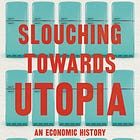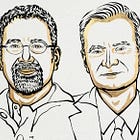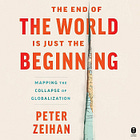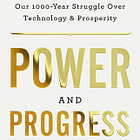For years, people have been asking me to give them a list of good popular economics books to read — as in, things a layperson can understand, rather than textbooks with equations and such. It’s a reasonable request, but for years, I procrastinated. But I’m doing it now, for two reasons.
First, I have a book coming out in Japanese in a few weeks, about the Japanese economy (there will eventually be an English version). After that, I’m going to start on my first English-language book, which will be about macroeconomics. So I figured I had better take stock of what people have already written, to think about how I can add value.
The second reason is that I saw this intriguing idea from Sam Enright:
I think I would find more value in an “anti-reading” list – a list of bad books and articles that are commonly recommended by smart people, but which are detested by people with deep expertise in the subject. What are the most harmful ideas in a field I am at risk of being taken in by?
I realized that this is a valuable exercise — most people are too polite to warn the public away from bad ideas. And in fact, I think that sweeping, questionable theories can be even more dangerous than outright bad ones. People are easily seduced by a theory that purports to explain vast complex phenomena in simple terms, and if the theory gets a few things right, it can seem to a layperson like the whole thing has been validated.1 Even though it’s often very useful and interesting to read these theories and think about them, the public deserves to be warned to exercise caution when deciding how much faith to put in them.
So anyway, here’s a list of good, bad, and questionable popular economics books. I’ve cited only recent books — things written since 1990. So no Wealth of Nations or Das Kapital or The General Theory of Employment, Interest, and Money.
Also, as always, if your favorite book (or your most hated book) doesn’t make it onto the list, it’s probably because I haven’t read it.2
Good overviews
There are a few popular books out there that will actually teach you economics — including economic concepts, theories, and research methods. Of books I’ve read, five really stand out. If you want to learn what modern economics is all about, but you don’t want to pick up a textbook, read these five books.
The Undercover Economist, by Tim Harford
This is basically an Econ 101 course disguised as a popular book. It goes through the basic concepts of microeconomics — supply and demand, game theory, etc. — and illustrates each one with simple examples from real life. Harford’s style is incredibly readable; The Undercover Economist is always light and entertaining, keeping you engaged without sacrificing nuance or accuracy. Of all the pop econ books I’ve read, this one is the closest model for what I’d like to write.
Mastering Metrics, by Joshua Angrist and Jörn-Steffen Pischke
In the past three decades, economics has changed from a largely theoretical enterprise to a mostly empirical discipline. Central to this shift has been the so-called “Credibility Revolution” in empirical economics — the development of a set of techniques that are much better (though hardly perfect) at isolating cause and effect. These tools are the bread and butter of what economists do nowadays, so if you want to understand how modern econ gets its results, you need to understand something about these methods. Mastering Metrics is a readable, entertaining introduction to the tools of the Credibility Revolution, by two of that revolution’s leading proponents. There’s a tiny bit of math, but don’t be scared — the authors are so good at explaining how empirical economics works that you’ll never get lost in the weeds.
Good Economics for Hard Times, by Abhijit Banerjee and Esther Duflo
If you want a summary about how economists have recently been thinking about big problems — things like trade, immigration, climate change, inequality, etc. — this is the book for you. If you still think of econ as a basically libertarian field, defined by folks like Milton Friedman, Good Economics for Hard Times is an important update. The discipline has shifted in the direction of endorsing government intervention, but in a pragmatic rather than an ideological way. Banerjee and Duflo sketch out a cautious middle path on most of the big issues of the day, endorsing eclectic, often incremental policy approaches, careful evidence-based analysis, and nuanced thinking about costs and benefits. It’s humble, practical, deeply empathetic book — a great antidote to the big sweeping claims of theorists who claim they have everything figured out.
The Myth of the Rational Market, by Justin Fox
The only book in this section that wasn’t written by an economist, The Myth of the Rational Market is nevertheless one of my very favorites. It’s the story of finance theory, and how early ideas about efficient, rational markets eventually had to make room for behavioral finance. Along the way, you’ll learn not just about the key figures involved — people like John von Neumann, Eugene Fama, Richard Thaler, and so on — but also about the theories themselves. You’ll learn a little bit about portfolio selection, factor models, and many other things that make finance academia tick. And you’ll understand more about what convinces the field of economics to change its mind on the big questions.
The Return of Depression Economics and the Crisis of 2008, by Paul Krugman
There aren’t many books that do a good job of explaining macroeconomics to a lay audience,3 but this one stands out from the rest. Krugman is probably the best economics explainer of our time. In The Return of Depression Economics, he tries to explain three interrelated phenomena — financial crises, aggregate demand shocks, and liquidity traps. These three things often go together, and 2008 is a great example — a financial crisis led to a shortage of demand, and the government had trouble reviving demand thanks to the fact that interest rates were at 0. Not every economic crash follows this pattern, but it’s a pretty common one, and Krugman does a great job of explaining some of the theories that economists use to think about those episodes.
Economic History
Economic history isn’t a substitute for economic theory — it’s a complement. Past events provide nuance that theory omits.
Slouching Towards Utopia, by Brad DeLong
I actually did a full review of this book here:
This is an economic history book, describing how amazing the “long 20th century” — which DeLong defines as 1870 to 2010 — actually was. This was the time when the world became truly modern, when much of humanity went from rural poverty to urban comfort, when starvation was mostly conquered and industrial modernity was invented. DeLong’s purpose is twofold — first, to get the reader to appreciate how awesome and unique those 140 years of growth really were, and second, to understand that some of the fundamental social and political questions raised by that period have yet to be answered. In particular, DeLong argues that inequality, economic risk, and lack of community are three issues that the market hasn’t managed to deal with, even as humans have gotten fabulously wealthy overall. A very good read.
Lords of Finance, by Liaquat Ahmed
This excellently written book is about the economic instability that led up to the Great Depression. It covers things like World War 1 reparation debt, hyperinflation, the gold standard, the 1920s stock market bubble, and the banking crisis that tipped the world into the disastrous 1930s. Ahmed tells this story through the eyes of central bankers in the U.S. and Europe, largely blaming them for failing to head off the catastrophe. I personally think he’s a little too hard on them — no one knew what they were dealing with at the time, and hindsight is always 20/20. But the lessons learned from the Depression are important nonetheless.
The Rise and Fall of American Growth, by Robert Gordon
This book famously argues that humanity has picked the low-hanging fruit of science and technology, and that this caused rapid economic growth that won’t be repeated in the future. Things like electricity, the internal combustion engine, and indoor plumbing can only be invented once, after all. Gordon’s book came out at the height of the post-2005 productivity slowdown, and seemed to offer a compelling (if pessimistic) explanation. (Tyler Cowen’s short book The Great Stagnation is another good book in this genre.) Now, with AI promising — or threatening — to upend and transform the entire global economy, Gordon’s thesis is receiving a lot less attention. But it’s still very much worth reading, and will teach you a lot of interesting history. And if AI ends up not delivering the promised productivity boom, there will certainly be a resurgence of interest in Gordon’s ideas.
Wages of Destruction, by Adam Tooze
This book is about the Nazi economy. It describes how Germany was basically an export-oriented economy before the Depression, and how it essentially switched from exports to rearmament as a source of demand for its factories (something I worry about China doing very soon). It argues that Hitler’s wild aggression was partly motivated by fear that the Nazi war economy would eventually be eclipsed by those of his rivals (which in fact it was). And it describes how the Nazis struggled to deal with their limited supply of basic commodities during the war — something that will inevitably be very important if we have another major war. All in all, a very timely and relevant book.
Crashed, by Adam Tooze
This is the best history of the eurozone crisis that I know of. If you think the U.S. responded badly to the 2008 financial crisis and the Great Recession that followed it, you should see Europe for comparison. Tooze discusses why the U.S. bounced back from the crisis more quickly than Europe — basically, a more vigorous stimulus response, better policy coordination, and more effective taxation. This book should make you a little more pessimistic about the EU as an economic institution going forward, unless big changes are made.
When Genius Failed, by Roger Lowenstein
This book is about a spectacular failure of applied economics. In the late 1990s, there was a huge hedge fund called Long Term Capital Management that promised to make untold amounts of money by using economic models to identify small temporary mispricings in the bond market, and then borrowing vast amounts of money to trade against those mispricings. LTCM had not one but two Nobel-winning economists. Of course the whole thing blew up, because there was stuff out there that the theories hadn’t taken into account — a scary foreshadowing of the much bigger blowup in 2008. Anyway, Lowenstein’s book is an incredibly fun, readable account of this little disaster.
Miscellaneous
Here are a few other books that I couldn’t fit into either of the sections above, but which are worth a read.
Streets of Gold, by Ran Abramitzky and Leah Boustan
This book is about the economics of immigration. It tries to answer the question of whether immigrants to the U.S. in the modern day end up doing better or worse than the European immigrants of a hundred years ago, in terms of things like income and cultural assimilation. The answer is “the same or better”. The book also reviews evidence that immigration has economic benefits for native-born Americans. I interviewed Leah Boustan here.
The Gift of Global Talent, by William Kerr
This is another book about immigration, but it focuses entirely on the high-skilled variety. It shows how much skilled immigrants contribute to the U.S. economy, explains the evidence that native-born Americans actually benefit from having more skilled immigrants working alongside them, and (mostly) debunks the idea of “brain drain”.
Economics Rules, by Dani Rodrik
I did a full review of this book for my old blog back in 2016. It’s Dani Rodrik — a highly respected but heterodox and somewhat iconoclastic economist — meditating on what his discipline gets right and what it gets wrong. He explains why most of the standard leftist criticisms of econ that you read in places like the Guardian are wrong. But he also notes that economists do themselves no favors by promoting simplistic ideas like “free trade is good” to the public, and saving all their nuance and disagreement for when they’re behind closed doors. I don’t agree with everything in this book, but it’s definitely worth a read if you care about the economics discipline.
Misbehaving, by Richard Thaler
This is a history of behavioral economics, from one of the people who invented it. It vividly shows how economists argue with each other, what kinds of evidence they accept and what they reject, and how consensus in the field changes.
Big questionable ideas
Now we start getting to the dangerous stuff. The world is a complex place, and phenomena like the rise and fall of nations, or century-long patterns of inequality, are too big for any scientist to study in a lab. Still, humans crave understanding (or at least, the feeling of understanding), and so they’ll inevitably spin grand theories that are difficult to evaluate one way or another. These theories are often valuable and worth reading, but inevitably have flaws. I recommend reading everything on this list, but always with caution and skepticism.
How Asia Works, by Joe Studwell
Believe it or not, this is actually my favorite pop economics book of all time. And that’s in spite of the fact that it makes some major mistakes:
(See also here.)
How Asia Works is a theory of how countries can industrialize and go from poverty to wealth. It advocates a three-pronged strategy: 1) agricultural land reform, 2) export promotion, and 3) control of the financial system to support export industries. Studwell recounts the post-WW2 history of successful industrializers like Japan, Korea, Taiwan, and China, and contrasts them with less successful ones in Southeast Asia. He determines that the three strategies listed above are the things that all the winners did. It’s an unproven theory, but a breathtakingly powerful and tantalizing one, and economists are starting to take it more seriously these days. A couple of years ago, I actually wrote a whole series of posts analyzing a bunch of developing countries through the lens of Studwell’s theory. Anyway, I heavily recommend this book.
Why Nations Fail, by Daron Acemoglu and James Robinson
I really like the big idea in this book, but I don’t trust my instincts. The big idea is that nations that build inclusive institutions — property rights, democracy, rule of law, and all the other stuff I tend to like — prosper over time, while nations that focus more on extracting value from their citizens tend to fail. I really like this idea, since it says that, in effect, the good guys win. But there are actually lots of problems with the empirical research that underlies the book (and which recently received a Nobel Prize). I summarized a few of those issues in a post last October:
Really, the question of why nations fail, and of the development of deep-rooted sociopolitical institutions over centuries, is too big to answer definitively at this point — and may never be answerable. But I still recommend reading Why Nations Fail, because the theory is at least interesting and compelling.
Bad Samaritans, by Ha-Joon Chang
This book — like most of Ha-Joon Chang’s books — espouses a theory of development very similar to Joe Studwell’s in How Asia Works. Chang is worth reading because he takes a very broad and historical view of economic development and industrial policy — you will always learn a lot from his books. I thought the most interesting tidbit in Bad Samaritans was how early British industrialists thought that German and Japanese factory workers were incorrigibly lazy — not exactly the stereotype we have today! The implication being that if you think a country can’t develop because its people lack the proper culture, you may simply be repeating old mistakes.
Capital in the Twenty-First Century, by Thomas Piketty
Like most people who either recommend or condemn this book, I haven’t actually read it. What I have read are several of Piketty’s papers on the topic of inequality, which is probably good enough to get the core ideas. In any case, I recommend reading Capital in the Twenty-First Century, even though I haven’t yet done so. The big theory — that inequality naturally rises over time unless war or revolution or disaster acts to bring people back down to a similar level again — is compelling and important. The data backing it up is somewhat spotty, as is typical for these big historical theories, but Piketty’s idea hasn’t yet been disproven.
Average is Over, by Tyler Cowen
In economics, the theory of “skill-biased technological change” is the idea that as technologies get harder and harder to use, society gets more unequal. Computers are the classic example here — smarter people can learn how to code really well, while less smart people can’t. Economists argue back and forth about how big of a deal this is. In Average is Over, Tyler argues that the coming age of AI will supercharge skill-biased technological change, causing extreme inequality between those who are able to make use of the new technology and those who aren’t. Color me skeptical. The existing research on AI consistently shows that on specific tasks, AI helps boost low performers much more than high performers. And that makes sense — AI is inherently a substitute for intelligence, and Econ 101 says that when substitutes become cheaper, price goes down. But anyway, Tyler’s theory is worth reading, and he has many other interesting predictions and policy recommendations that don’t necessarily depend on that central thesis.
The End of the World is Just the Beginning, by Peter Zeihan
I wrote a review of this book back in 2023:
Basically, this book predicts that a combination of A) rapid population aging, and B) the U.S.’ withdrawal from its role as guarantor of global security will cause much of the global economy will collapse. Billions will die, economies will be fragmented and limited to local regions, and people who live in places without enough critical minerals, waterways, and other natural resources will be impoverished. I don’t think that’s going to happen — humans are much too good at finding substitutes for resources and working out new collective security arrangements. But I do think the challenges Zeihan identifies are real ones, and that he’s generally reasonable about the direction of the effects they’ll have, if not the magnitude. So the book is still a fun and interesting read.
Books to avoid
And here we come to my “anti-reading” list.4 I’ll try to keep it short, but there are some pop econ books whose ideas and argumentation are so poor that the average person will not benefit from reading them.
Power and Progress, by Daron Acemoglu and Simon Johnson
I wrote a really long and mostly negative review of this book a year ago:
In a nutshell, this book says that the Luddites were right, and that automation is bad for average people. The history and evidence to support this argument are both highly questionable, and sometimes just plain sloppy. Meanwhile, the authors’ policy recommendation is that tech businesses should be incentivized or compelled to invent technologies that complement human labor, instead of ones that automate it away — as if any entrepreneur or engineer knows that in advance. The whole book isn’t very credible, and feels more than anything like a jeremiad against the tech-bro class.
Debt: The First 5000 Years, by David Graber
I can hardly believe it was 11 years ago, but in my early days as a fiery and irritable blogger I once wrote a scathing review of David Graeber’s Debt: The First 5000 Years. Just for fun, let me quote from that review:
[T]he main problem with Debt: The First 5000 Years is that after slogging through all 560 pages, I can't for the life of me tell what point it's trying to make about the phenomenon of debt…Debt is a sprawling, rambling, confused book…Graeber continually talks around the idea of debt…Perhaps capitalism is a rotten, inhumane system that kills relationships, rewards violence and trickery, and enslaves us all to the brutal logic of the market before inevitably destroying the planet. Or perhaps not. But either way, there's little insight to be gained by reframing the issue in terms of debt.
I don’t think I can do better than that summary here.
The Deficit Myth, by Stephanie Kelton
No, I haven’t read this book! I have a limited time to exist and be awake in this universe, and I am not going to spend it reading a 336-page book about MMT. For those who don’t know, MMT is a pseudo-theory5 that pushes infinite government deficits without concretely specifying why deficits are safe or how they think the economy actually works. I haven’t read The Deficit Myth, but I have read a couple of MMT papers, and that was quite enough to get the gist:
When economists do read Kelton’s book, they come away with the same conclusion: there’s just no actual theory there. Here’s what a pair of economists from the Banque de France had to say:
Overall, it appears that MMT…is a more that of a political manifesto than of a genuine economic theory…As Hartley (2020) notes, MMT “is not a falsifiable scientific theory: it is rather a political and moral statement by those who believe in the righteousness – and affordability – of unlimited government spending to achieve progressive ends”.
And here’s Giacomo Rondina of the University of California San Diego:
[M]y reading of the MMT academic literature suggests that MMT has not yet provided a fully coherent theory of the macroeconomics of government intervention…As a consequence, many macroeconomic practitioners “peeking under the hood” (cit.) of MMT cannot help but feel a sense of frustration in understanding how exactly the engine is supposed to work.
I salute these brave souls for being able to endure more MMT nonsense than I was. In any case, my friendly advice is to do what I did instead, and avoid spending mental effort on this stuff.
Freakonomics, by Steven Levitt and Stephen Dubner
The years have not been kind to poor old Freakonomics. The blockbuster result that made the book famous — that abortion caused the big crime drop in America, by reducing the number of unwanted children who grow up to commit lots of crimes — turned out to probably be false. Some other economists found a coding error in the famous abortion-crime study that totally invalidated the result. The authors tried to argue that it still held, using some more complicated methods, but these methods weren’t very credible or convincing. Meanwhile, the other chapters in the book are often more about sociology and anthropology than economics, and the chapters that are about economics tend to be about results that are cute but ultimately not that important. Freakonomics is a fun read, but at this point it’s more of a historical artifact than a guide to good economics.
And not even a layperson. The other day I had a political scientist tell me that political science is a more predictive field than economics. As evidence he cited a case of several political scientists who predicted in 2016 that Donald Trump would be a bad President.
Or perhaps because I’m trying to suppress all knowledge of its existence, because your favorite author’s theory represents a mortal threat to the corrupt and shadowy oligarchs whom I secretly serve. Or perhaps I found your favorite book just too unremarkable to mention. Whichever of these it is, I apologize.
As I said, I am planning to write one soon.
Interestingly, most of the bad books tend to be leftist in their ideological orientation. There are also a bunch of bad economic ideas out there that are more rightist — goldbug-ism, some of the economic theorizing around Bitcoin, and MAGA-style protectionism. But these tend not to have popular books associated with them — or at least none that I’ve heard of.
MMT is a movement rather than a theory — a cabal consisting of Warren Mosler, Stephanie Kelton, and a handful of others, whose pronouncements are taken as received truth by the movement’s followers. Inevitably, it’s the pronouncements of these gurus that are treated as the only authentic guide to what MMT really says about the economy; any outsider is not permitted to interpret or apply the “theory” on their own.

















Can I pay extra for a more comprehensive anti-reading list? 😎🤫
As for Acemoglu, I like his The Narrow Corridor which I think is intellectual modest (not claiming too much), though I haven't read Why Nations Fail so can't compare.
I also like The Dictator's Handbook by de Mesquita, and Wars, Guns, and Votes by Collier with similar/related themes.
I wonder what you think about Golden Fetters by Eichengreen his other writings sound sometimes sketchy but this one seems legit.